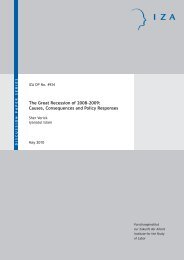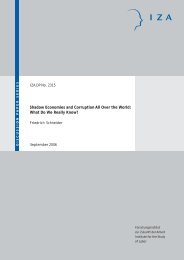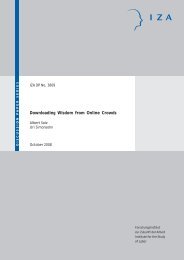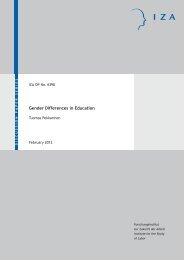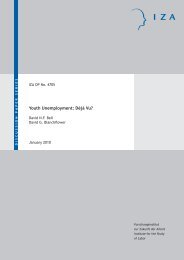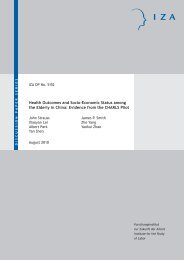Extra Status and Extra Stress: Are Promotions Good for Us? - Iza
Extra Status and Extra Stress: Are Promotions Good for Us? - Iza
Extra Status and Extra Stress: Are Promotions Good for Us? - Iza
Create successful ePaper yourself
Turn your PDF publications into a flip-book with our unique Google optimized e-Paper software.
12 months) than <strong>for</strong> other workers (0.154 at 0-6 months <strong>and</strong> 0.108 at 6-12 months). Moreover,<br />
there are no strikingly large effects <strong>for</strong> hours worked or job stress <strong>for</strong> this subgroup.<br />
In an attempt to explain the negative mental health effects <strong>for</strong> these workers, we<br />
examined whether promotions <strong>for</strong> young men with low education were more likely to involve<br />
moves to supervisory roles, which may be a particularly stressful change <strong>for</strong> this subset of<br />
workers. However, the data does not support this hypothesis, with the effect of promotions on the<br />
probability of having supervisory responsibilities being smaller <strong>for</strong> these workers than <strong>for</strong> other<br />
workers. Interestingly though, young men with low education who receive a promotion<br />
experience particularly large positive gains in job control, relative to other workers (around 2.5<br />
times larger), suggesting that their roles do change significantly.<br />
7. Conclusion<br />
<strong>Are</strong> promotions good <strong>for</strong> us? To answer this question, we first examined changes in<br />
workers’ perceptions of their job in the lead up to receiving their promotion <strong>and</strong> in the several<br />
years afterwards. Perhaps unsurprisingly, we find that in the first year or two afterwards, workers<br />
feel their jobs are more secure, they have more control (decision-making freedom), <strong>and</strong> they are<br />
more fairly paid, while at the same time, they feel more stressed <strong>and</strong> work longer hours. Overall,<br />
worker job satisfaction is significantly higher than it was preceding the promotion. By the three<br />
year mark, however, the positive feelings are largely absent. Workers no longer feel more secure<br />
or well paid (despite having higher incomes <strong>and</strong> greater job control), <strong>and</strong> their overall job<br />
satisfaction has returned to pre-promotion levels, while in contrast, stress <strong>and</strong> work hours remain<br />
high.<br />
Surprisingly, the positive promotion effects in the short-term <strong>and</strong> the negative effects in<br />
the longer-term do not translate in to large wellbeing effects. We find no evidence that<br />
promotions impact general health or life satisfaction, be<strong>for</strong>e or after receiving the promotion.<br />
The only significant promotion effects are <strong>for</strong> mental health: in the medium term – 2+ years after<br />
promotion receipt – worker mental health is significantly lower than be<strong>for</strong>e the promotion. The<br />
negative mental health effects are primarily driven by anxiety-type feelings, with promotions<br />
estimated to reduce feelings of calm <strong>and</strong> peacefulness, <strong>and</strong> increase feelings of nervousness. In<br />
addition, the effects are particularly severe <strong>for</strong> younger male workers without university degrees.<br />
19







